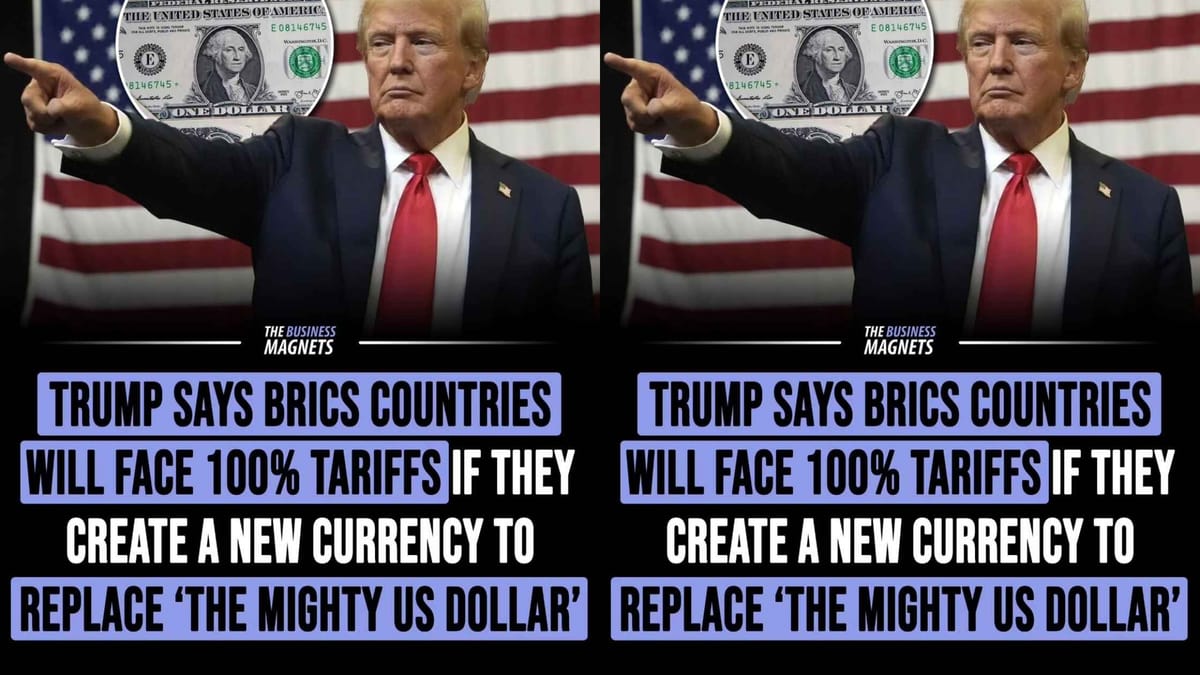Trump Says BRICS Countries Will Face 100% Tariffs If They Create a New Currency to Replace the 'Mighty US Dollar'
In a bold and sweeping statement, former President Donald Trump has issued a stern warning to the BRICS countries, threatening massive economic repercussions if they attempt to create a new global currency to rival the U.S.

lar. Trump's remarks, delivered on his Truth Social platform, have reignited global debates on trade, currency dominance, and international relations.
"No Chance BRICS Replaces the Mighty US Dollar"
Addressing rising speculation surrounding the BRICS economic alliance (comprising Brazil, Russia, India, China, and South Africa), Trump declared that any moves to challenge the dollar's supremacy would not go unanswered. "No chance BRICS replaces the mighty US dollar," Trump posted. He further elaborated that countries seeking to undermine the greenback's global standing would face severe consequences, including 100% tariffs on all their exports to the United States.
For context, BRICS leaders have been openly discussing alternatives to the U.S. dollar in recent years. Motivated by sanctions, trade dependencies, and shifts in economic power, these countries have hinted at creating a unified currency or a framework to settle trade outside of the dollar-based system.
What Would 100% Tariffs Mean?
If Trump's threat materializes, 100% tariffs on BRICS nations would effectively double the cost of their goods entering the U.S. market. This move would:
- Cripple Competitiveness: Products from BRICS countries would become significantly more expensive for U.S. consumers, causing demand to plummet.
- For example, China, a BRICS powerhouse, accounts for billions of dollars in exports to the U.S., including electronics, machinery, and textiles. Doubling their prices would have widespread implications across supply chains and industries.
- Economic Fallout: Exporters in BRICS countries would face massive financial losses as the U.S. remains one of the largest global markets. Trade-dependent sectors could collapse, leading to job losses and economic instability in these nations.
- Diplomatic Strains: The enforcement of such tariffs would severely escalate trade tensions, pushing BRICS countries to retaliate with their own tariffs or sanctions. The fallout could disrupt global trade and deepen geopolitical divides.
Why the Dollar Remains Dominant
The U.S. dollar has been the backbone of the global economy for decades. Used as the world's primary reserve currency, it facilitates international trade, stabilizes financial systems, and provides trust due to the strength of the U.S. economy. However, challenges to its dominance have been growing:
- Geopolitical Tensions: Sanctions on Russia and other countries have motivated BRICS and their allies to seek alternatives to dollar-based transactions.
- Economic Power Shifts: China's rapid growth, combined with India's expanding influence, signals an emerging multi-polar economic world.
- BRICS Initiatives: The bloc has already initiated discussions to trade in local currencies and reduce reliance on the dollar for settlements.
Despite these efforts, Trump’s message underscores his belief in the dollar's enduring dominance. His proposed tariffs highlight the economic leverage the United States holds and its readiness to use trade as a weapon against threats to its currency.
Global Reactions and Future Implications
Trump's statement has triggered mixed reactions worldwide. Supporters argue that protecting the dollar is essential for the stability of the U.S. economy, which is deeply intertwined with global markets. Critics, however, warn that escalating trade wars could harm both the U.S. and its trading partners, pushing BRICS nations to accelerate their plans to decouple from the dollar.
Economists are divided on the feasibility of a BRICS currency replacing the dollar. While the alliance represents a significant portion of global GDP, creating a unified currency requires overcoming major hurdles such as political differences, economic disparities, and infrastructure challenges.
As Trump's rhetoric signals a willingness to prioritize the U.S. economy above global cooperation, the world waits to see how BRICS leaders will respond. Will this threat deter their ambitions, or will it solidify their resolve to break free from dollar dependence?
One thing remains clear—the battle for currency dominance is heating up, and its outcome could reshape the global economic order for decades to come.




